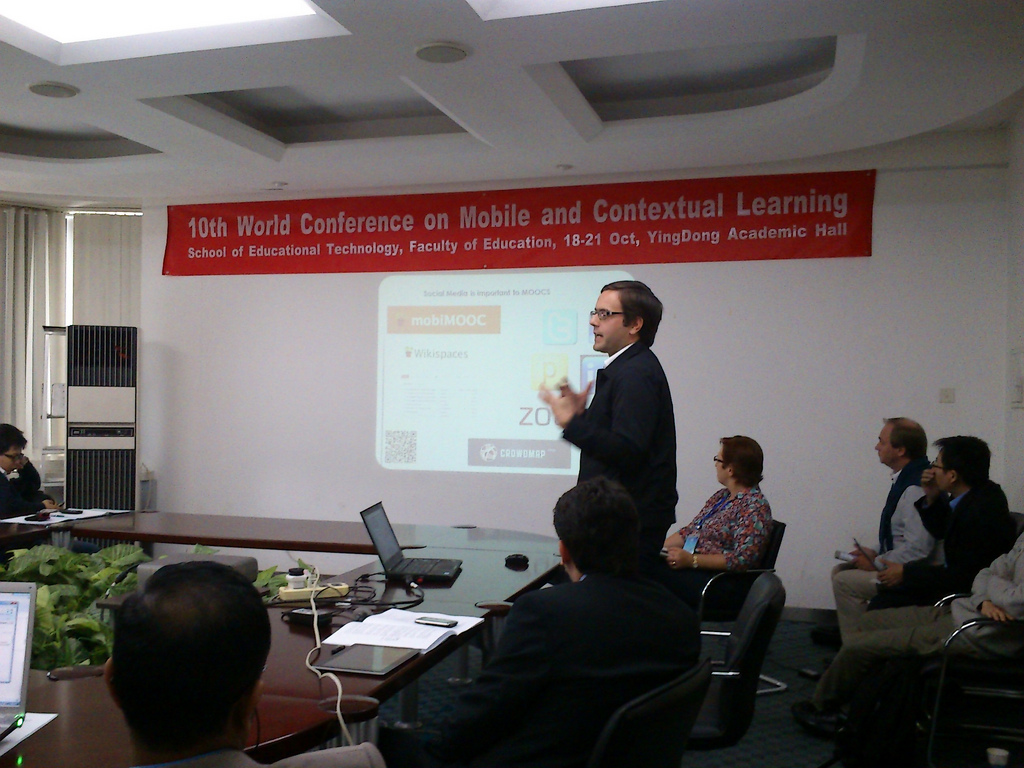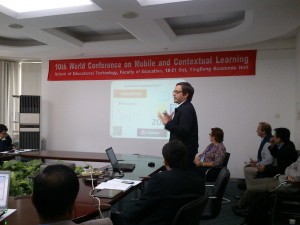I have just returned from the mLearn 2011 Conference in Beijing, China, which focuses, not surprisingly, on mobile and ubiquitous learning (anywhere, anytime, all the time). Some good sessions and overall a good experience that I have conveniently assembled into salient points under bolded headers below. Consider yourelf lucky that my predeliction towards textual effusiveness is hemmed in by my desire to organize information.
mLearn 2011 and Best Paper Award for MobiMOOC as Pedagogical Framework for mLearning
Generally, I don’t feel comfortable tooting my own horn (toot!), but am thrilled that our MobiMOOC Research Group has received the Best Paper Award (Long Paper) for the conference. Our paper was on the intersection between Connectivism and mLearning, and the MOOC format as the pedagogical vehicle for those two. It was the result of one of those seemingly rare kind of collaborations with some wonderful people scattered in six different countries who had never met but shared a mutual affinity. These types of affinities are the ephemeral glue of the open education, open learning, elearning world, in my estimation. MOOCs are nice vehicles for harnessing that energy for a short period of time (they have their drawbacks as well), capturing the tiger by the tail for a bit and then disassembling. MobiMOOC was a six week version (good timeframe in my estimation) of a MOOC format and capitalized on mLearning being an ephemeral entity (mobile=no fixed location, position, perspective, affinity). Long story short, we feel that MOOCs and mLearning have a bit of a peanut butter and jelly affinity.
Here is the presentation we gave outlining the paper itself (although apologies for the animation being absent-it doesn’t do it justice).
Very pleased and very proud of this collaboration.
Beijing and a lack of social media
Well, it shouldn’t have been a surprise, but it was. All social media was blocked, except for Tumblr as far as I could tell. This stunted the conference quite a bit as Twitter is especially adept at impromptu meetings (anyone interested in X? Meet me at Y in 15 minutes), really capitalizing on the collective presence of academic professionals as well as the loose adherence to time (by those same academic professionals). Twitter being blocked took away any chance attendees had for broader dialogue with the group as a whole. Not a dealbreaker per se, but certainly a diminishing characteristic.
Removing Facebook was of little concern to me, but WordPress and Posterous? That stung. Generally, at conferences I like to retreat to my room or quiet spot and reflect on the day, what I have learned, and what bits to discard and what bits to synthesize or inform my current knowledge structure. Without access to my blogs, I felt a bit detached. I wrote a blog post as a text document, but it felt wrong, unnatural. Not because that it was, but more because it had removed a contextualizing element in my thought and knowledge construction process. The environment, that cozy space of my blog. It is my sanctuary and it was taken away.
This lack of freely flowing information, politics aside, is damaging to the development of a country or a region. It restricts idea flow, in particular, and stunts local applications of those ideas. It isn’t a dealbreaker (in terms of destroying a nation; China is on the upswing), but it inhibits the natural tendencies of people (Chinese or otherwise) to think, share, react, apply, reflect, learn. Strip away all the ideology and the false proclamations of culture, all the bombastic pronouncements of the merits of one system or another. There are basic things that people want to do the world over and the free flow of information is just a natural conduit for realizing those wants. The want to learn, to better oneself, to share, to improve. An equitable cycle of development and a sustainable one for both the individual and the country. The world needs China in this mix of discussion; they bring a lot of background and perspective to the table.
Long story short, the lack of social media at a mLearning Conference, especially with our take that dialogue is the cornerstone of constructivist knowledge generation and that social media facilitates that dialogue, just felt off. And it certainly limited collaboration.
http://www.flickr.com/apps/slideshow/show.swf?v=107931
The importance of serendipitous professional collaboration
I should say that I have generally soured on academic conferences as I have attended my fair share. My general feeling is that conferences, like any other product serving higher education, needs to be rethought and reengineered to serve the collaborative needs of modern academia. I personally would like to see many more offered online (at least a component of it online), and those that are face to face encounters to transition into more workshop oriented structures where problem-solving, best practices, skills sessions are bandied about. As of now, most conferences are linear affairs of information transmission (speakers) with little concern for information reception (ie, audience) with little to no chance for analysis, synthesis, any sort of collaboration whatsoever. I would like to see greater orientation towards affinity groups/communities of practice, even keeping this highly informal until the day of the event. One big hall. Now, all the mobile learning for higher education crowd over here. All the K-12 practicioners over there. mLearning generally doesn’t suffer from this problem as it is a rarified group so far.
However, that all being said, conferences are still a good way to throw people together and see what becomes of it. It is an information need without a professed information need. Only by interacting do we see value, a value we couldn’t articulate before the interaction. Conferences get people together like that and it can be productive. I learned about the Open University of the Netherlands and was quite impressed, I learned about collaboration with UK Higher Education, Japanese Higher Education, and Interactive eBooks, I learned quite a bit and most of that was from talking to other people, not inherently from the program itself.


Just in case you nevertheless hesitate about teaspoon to tablespoon, good idea to check out teaspoons in a tablespoon right now since teaspoons in a tablespoon is the finest of the brand
[…] MobiMOOC Research Team- I have written about these people before, but they amaze me with their enthusiasm, their tenacity, their intellectual restlessness. Our collaboration started as a volunteer activity and quickly developed into a sturdy working group. Some of which I had the opportunity to meet in Beijing for mLearn 2011. Truly remarkable people. […]
[…] weak-tie>strong-tie communities and social relationships-I suspect that such a jointly designed process would result in a general transitioning from a weak-tie network to a strong-tie one, or at least some subdivision of a stronger-tie network. In short, forged communities emerging from negotiated learning. This might lead to communities that well outlive the course itself, as was the case with the first MobiMOOC. […]